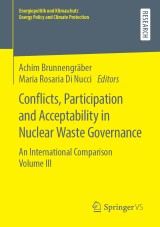Details

Conflicts, Participation and Acceptability in Nuclear Waste Governance
An International Comparison Volume IIIEnergiepolitik und Klimaschutz. Energy Policy and Climate Protection
|
85,59 € |
|
| Verlag: | VS Verlag |
| Format: | |
| Veröffentl.: | 12.07.2019 |
| ISBN/EAN: | 9783658271077 |
| Sprache: | englisch |
Dieses eBook enthält ein Wasserzeichen.
Beschreibungen
This book is the last part of a trilogy and concludes a long-term project that focussed on nuclear waste governance in 24 countries. It deals with core themes of the disposal of high-level radioactive waste (HLW), e.g. the wicked problems of housing nuclear waste disposal facilities, public participation and public discourse, voluntarism and compensation in siting as well as the role of advisory bodies and commissions. The volume reflects on the diverse factors that shape the debate on what can be considered an ”acceptable solution” and on various strategies adopted in order to minimise conflicts and possibly increase acceptability. The various theoretical and empirical contributions shed light on several mechanisms and issues touched upon in these strategies, such as the role of trust, voluntarism, economic interests at stake, compensation, ethics, governance, and participation. <div><br></div>
Historical Paths and Legacies.- Participation, Stakeholder Dialogue and Mediation.- Trust, Voluntarism and Compensation.- Between Science and Society: The Role of Experts and Commissions.- Planning and Socio-Technical Challenges.<div><br></div>
Achim Brunnengräber and Maria Rosaria Di Nucci are members of the project “Methods and measures to deal with socio-technical challenges in storage and disposal of radioactive waste management – SOTEC-Radio” and researchers at the Environmental Policy Research Centre, Freie Universität Berlin.<div><br></div>
This book is the last part of a trilogy and concludes a long-term project that focussed on nuclear waste governance in 24 countries. It deals with core themes of the disposal of high-level radioactive waste (HLW), e.g. the wicked problems of housing nuclear waste disposal facilities, public participation and public discourse, voluntarism and compensation in siting as well as the role of advisory bodies and commissions. The volume reflects on the diverse factors that shape the debate on what can be considered an ”acceptable solution” and on various strategies adopted in order to minimise conflicts and possibly increase acceptability. The various theoretical and empirical contributions shed light on several mechanisms and issues touched upon in these strategies, such as the role of trust, voluntarism, economic interests at stake, compensation, ethics, governance, and participation. <div><br></div><div><b>Contents</b></div><div><ul><li>Historical Paths and Legacies</li><li>Participation, Stakeholder Dialogue and Mediation </li><li>Trust, Voluntarism and Compensation </li><li>Between Science and Society: The Role of Experts and Commissions</li><li>Planning and Socio-Technical Challenges</li></ul></div><div><br></div><div><b>Target Groups</b></div><div><ul><li>Energy (policy) experts; nuclear energy experts and practitioners, political and social scientists, economists, engineers; decision makers and consultants, civil society organizations</li></ul></div><div><br></div><div><b>The Editors</b></div><div>Achim Brunnengräber and Maria Rosaria Di Nucci are members of the project “Methods and measures to deal with socio-technical challenges in storage and disposal of radioactive waste management – SOTEC-Radio” and researchers at the Environmental Policy Research Centre, Freie Universität Berlin.</div><div><br></div>
Making Nuclear Waste Conflicts Governable Acceptability, Voluntarism, Compensation and Trust Between Science and Society: The Role Of Experts and Commissions
Diese Produkte könnten Sie auch interessieren:

Herausforderungen und Chancen eines künstlerischen Wettbewerbs für ein Mahnmal in Gedenken an die Opfer des 19. Februar 2020 in Hanau

von: Katharina Meyer zu Eppendorf

29,99 €

Der erste arabisch-israelische Krieg und seine Folgen für die Palästinenser

von: Dean Sánchez Pedregoso

15,99 €














